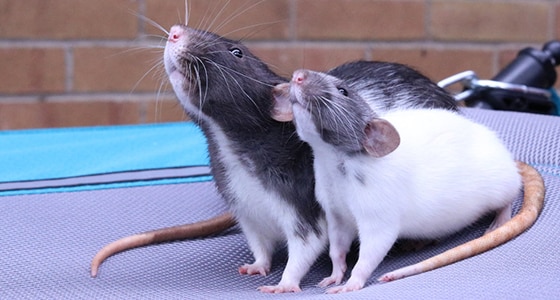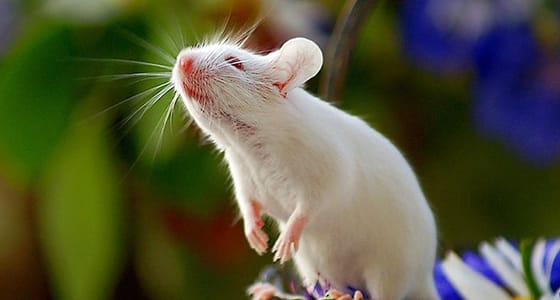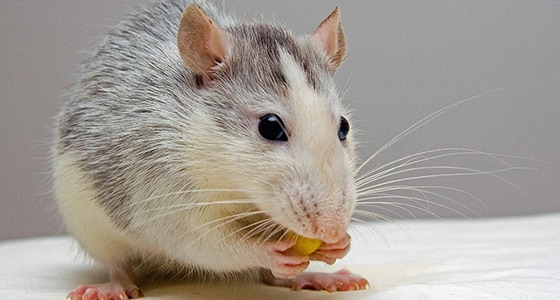If you’re a rat owner, then you’ve probably encountered your fair share of naysayers. It seems there are always people who are flatout disgusted by rats, who think that rats are dirty or disease-ridden or just plain mean. If you own rats, then you know that none of these are accurate assumptions for people to make about your pet. But, still, you’re fairly likely to hear comments like these from your parents, your teachers, your family members, and even your friends. Many people have been conditioned to think of rats in a negative light, and they may not even be willing to consider a different opinion. However, if you come across someone who currently has a negative view of rats, but is willing to reconsider that position, then you should be ready to refute a few of the common misconceptions about pet rats. With a little bit of logical persuasion, and with the chance to meet your pet rat, you may be able to make a convert out of a skeptic.
Pet rats are a different species than street rats
Many people, when they think of rats, think of street rats. They think of wild rats, like the kind you might see on the streets of New York City. Or, if they’re from more rural areas, perhaps they think of barn rats, like Templeton Rat from Charlotte’s Web. And, when they think of this kind of rat, they think of meanness and dirtiness. This makes sense given the interactions that most people have had with rats. In cities, street rats often live in dirty, unkempt, scary places. And, to take the example of Templeton Rat, he’s given a very mean personality in the classic children’s story. If this is the only exposure a person has had to rats, then it can make sense that the person would have a negative perspective on rats.

However, the truth is that your pet rat is not the same species as a street rat or a barn rat. Domesticated rats are of a species called fancy rats, unlike street rats, which are often referred to as “common rats.” More specifically, street rats are part of the species known as brown rats. Barn rats, also known as house rats, are of the species known as black rats.
In comparison, Fancy rats are bred to be friendlier than common rats, which often manifests as loving and attached behavior. In this way, fancy rats are just like other pets — they get attached to their owner, and display loving behavior such as nuzzling and burrowing. In addition to be loving, fancy rats are also playful, which not everyone realizes. When fancy rats are kept healthy and happy, they love to go hunting for treasures, and to play games with their toys or with their rat siblings. These behaviors open up possibilities for all types of positive interactions with your pet rat — none of which include the “mean” behavior that people expect of street rats.
In addition to brown rats and black rats, people may also think of laboratory rats, which again are different from fancy rats. Laboratory rats are a variation of the brown rat species. They are not used in labs as often as mice are, but are sometimes preferred because of their intelligence. If the person you’re talking with has experience working in a laboratory, they may think of this type of rat when you begin talking about your pet. But, once again, this type of rat is bred for entirely different traits than your pet fancy rat.
Healthy fancy rats don’t carry diseases
Perhaps the most common identifiable fear that people have of rats is that they carry disease. They may even cite the Black Death, which was an outbreak of the bubonic plague, carried by rodents in the 1300s. To be fair to this point, the Black Death did kill as many as 200 million people. It was indeed a tragic period of human history, and on the surface it seems like a valid reason to fear rats.

However, once again, domesticated rats are not the same species that carried the bubonic plague all those centuries ago. A healthy pet rat that is taken care of will not carry a disease like this, or any disease at all. Your pet rat wasn’t just scooped up off the street, it was bred by a reputable breeder, from a line of other healthy, happy rats. And, so long as you’ve been taking good care of your pet, s/he is very likely to remain healthy. This is particularly true if your pet rat lives indoors at all times. In some cases, exposure to wild rat populations can lead to developing diseases that can be transmitted to humans — such as salmonella. However, if your rat is never exposed to wild rat populations, then there is little evidence to suggest that salmonella could be contracted.
The one concern that a pet owner may have with their rat is that they will develop rat-bite fever. This occurs when a person is bit by a domesticated rat, and then becomes ill with shakes, aches, and a fever. Although rat-bite fever rarely manifests in the rat itself, the disease is very uncommon among rats that were purchased from a reputable breeder. Typically, it is only seen in rats that were purchased from poorly-run pet stores or box stores. So, this concern is again very easy to avoid, simply by making sure that you only purchase your pet rats from reputable breeders who truly know what they are doing. This may be more expensive in the short term, but it will pay in the long haul when you have a healthy, happy pet.
Although your rat is unlikely to develop diseases that are common among wild rats if s/he lives entirely indoors, it should be noted that your rat can develop other diseases from being cooped up. Most of these diseases would not affect you, but they could affect the overall health and wellbeing of your pet. The majority of these diseases and illnesses can be prevented by making sure that your rat has plenty of room to play, by changing your rat’s bedding regularly, and by giving your rat plenty of water and nutritious food. With proper care, your rat should remain healthy, and is unlikely to develop or spread any diseases.
Fancy rats are clean and tidy
Another concern that people have with rats is that they’re dirty. As discussed above, this is likely because people associate street rats with dirty, dark places, and they assume that pet rats live in much the same manner. However, this simply isn’t true. Fancy rats are very clean animals, and they groom themselves multiple times a day in order to stay clean. This is also true of mice, despite what people might think. Fancy rats also like to keep their living areas clean.

When you’re talking to a skeptic about your pet rat, they may not quite believe you that your pet is very tidy. If possible, the best way to prove this is simply by taking your friend to meet your rat and see how clean s/he really is.
However, in order for your rat to keep clean, s/he does need your help. Because s/he is confined to living in a cage, there’s not much of a way for your pet rat to keep the cage itself clean alone. In order to give your rat the tools needed to stay clean, you must make sure that you change the bedding, as well as the food and the water, regularly. You should also do a thorough cleaning of the cage as often as necessary. This would involve taking your rat entirely out of the cage, clearing the cage of all bedding and toys, and fully wiping down all the surfaces. Doing this regular deep cleaning will keep your rat’s cage from beginning to smell, and will allow your rat to stay as clean as possible.
You can also bathe your rat every once in a while, do help even more with any smells that might otherwise accumulate. You don’t need to bathe your rat at all, but if you do choose to, make sure to use animal shampoo or other very gentle shampoos. And, don’t bathe your rat too often. Doing so can make your rat’s fur and skin become dry and unhealthy. However, occasional bathing is perfectly healthy and can help your rat smell extra clean.
Keep in mind that if you notice your rat stops keeping clean or stops grooming, this may be a sign of sickness. If you notice any significant behavioral change, you should take your rat to the vet to make sure that there isn’t an underlying illness. This includes grooming behaviors. Excessive grooming or itching can also be a sign of skin problems, and is cause for you to bring your rat in for a checkup. As with all pets, it’s important that you keep a close eye on your rat’s behaviors so that you can tell if those behaviors are changing. Since pets can’t tell you when they’re feeling ill, it’s up to you to monitor any sudden changes and take quick action to make sure you can get your pet back to healthy as soon as possible.
Give pet rats a chance — in person
At the end of the day, talking can only go so far in convincing someone to change their opinion about pet rats. If you really want to show someone that your rat is a sweet and loving pet, then they’ll have to meet your pet. Many people who were firmly against rats became converts when they actually met a friendly pet rat.

However, it’s important not to force someone to meet your pet before they’re ready. Even though your pet is the sweetest, cutest thing in your eyes, other people may have legitimate fears and phobias that aren’t easily overcome. You can’t force someone to love your pet as much as you do. But, you can invite them over and try to show them how friendly your pet is. If the person is nervous, start by simply having them stand near the cage while the door is still locked. That way, they can watch your pet sleep, burrow, or play, but they won’t be concerned about your rat getting out of the cage unexpectedly. If the person reacts positively to this interaction, you can move forward and let them pet the rat. Try holding your rat in your own hands, in a secure way so that your pet rat doesn’t move toward your friend before they’re ready. Then, let the person pet your rat, gingerly. Advise them on how to pet your rat, and tell them what your rat’s favorite way to get attention is.
If this all goes well, you can have the person actually hold and play with your pet rat. Keep an eye on the situation still, as the person may become unexpectedly frightened, and you don’t want to risk your rat falling out of someone’s hands when they’re scared. This entire process of acclimating a person to your pet rat may take some time. The interactions may need to be spaced out over several days or even several weeks, to ensure that the person is comfortable during the entire time.
Try not to get frustrated if this does take some time, or if the person never becomes comfortable enough to actually hold your pet rat. Everyone has different preferences and different fears, so some people may never come around to loving your rat as much as you do. If other people love your pet as well, that’s fantastic, and there’s nothing wrong with trying to show them how wonderful your pet is. But, the most important thing is that you love and care for your pet rat, and give him/her the best possible life.



